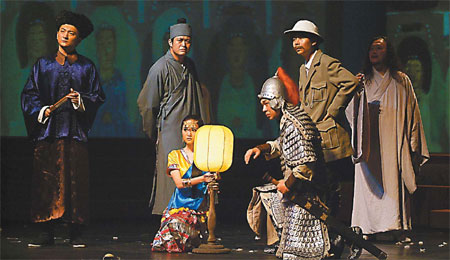In the original plan, the drama Dunhuang was supposed to run after China Central Television broadcasts the documentary of the same title. Leo Wang, initiator of Dunhuang Culture Promotion Foundation which financed both the play and the documentary, said that he thought the documentary would spur audiences to go to the theater to find out more about Dunhuang.
However, the play premiered at Poly Theater last Thursday while the documentary is scheduled to go on the air at the end of this year.
Local theater-goers went to the premiere with great expectations because it was written and directed by Zhou Bing, a newcomer to theater but his TV documentary The Forbidden City (2004) was critically acclaimed. What's more, Zhang Guangtian, China's leading avant-garde theater director, is also involved in the production. But to most people's disappointment, though the play does focus on some aspects of Dunhuang, it is not an impressive drama.
Possibly the crew themselves were not confident about the play which began production merely four months ago. They closed dress rehearsal from the press, reworked the plot up until the opening day and even changed the ending scene six hours before the curtains went up.
To some extent, the play is Zhou's personal reflections of Dunhuang where he and his crew shot the documentary over the last three years. So naturally the play is seen through the eyes of a group of documentary crew. The "director" and the "camera man" argue about the merits of the Hungarian-born British archeologist Marc Aurel Stein (1862-1943) who bribed Abbot Wang Yuanlu, the leader of the monastic group in charge of the caves at Dunhuang, and smuggled away thousands of treasured manuscripts written in Chinese, Sanskrit, Sogdian, Tibetan and Runic Turki in 1907.
In the next scene, the Abbot Wang and Stein appear on stage and guide the audience on an expedition across time and space into the lives of Yue Zun, who dug the very first cave in Dunhuang in AC 366; Monk Tan Wubi, a prince in the Southern and Northern Dynasties (AD 420-589) who gave up wealth and fame to practice Buddhism in Dunhuang; Cheng Fo'er, a girl who used to be a royal dancer at the court of Tang Dynasty (AD 618-907) and was later stranded in Dunhuang; and Shi Xiaoyu, a cave painter in Yuan Dynasty (1206-1368).
In Zhou's interpretation, Tan's deeds represent the monk's indifference to wealth and fame; Cheng Fo'er who dies for love represents a woman's pursuit for love while painter Shi Xiaoyu who divorced his wife and sells his son in order to concentrate on painting is an extreme example of devotion to art.
The play also features long monologues by every character and some enchanting dance routines choreographed by well-known Taiwanese dancer and choreographer Jessie Fan.
However, while Zhou admits that "there are many problems", he is still confident about the play because it boasts "the cream of Chinese arts and culture for a drama".
Traditionally, Dun means large, while Huang means prosperous. However after much research, Zhou found that Huang also means the light.
"I found most paintings and sculptures in the caves of Dunhuang expressed people's pursuit of light. The diverse religions and beliefs popular in Dunhuang all hold respect and pursuit of light. So one of the themes of both the documentary and the play is different persons' understanding and pursuit of light," says Zhou, a Buddhist.
The other major theme of both the documentary and the play is the harmony of different cultures in Dunhuang. For this reason, Zhou believes the play reflects issues facing today's global community.
"No matter in the past or today, people face the same problems, how different civilizations develop themselves while communicating and conflicting with each other. More than 1,000 years ago, Dunhuang was the center of various ethnic peoples. The cultures of ancient Greece, India, Persia and China met there and together created the rich and prosperous arts and culture in Dunhuang."
Zhou's previous documentary, The Forbidden City, proves his ability in that medium. But why did he choose to pursue theater, of which he has little experience?
"Documentaries require that you present facts and real information about the subject while drama allows you to free your imagination and present a more personal interpretation of the subject. What I could not say in the documentary, I could say in the play," Zhou says.
In some parts of the play Zhou's creativity comes to the fore. For example, he portrays Abbot Wang and Stein from a new perspective. Chinese used to consider Wang as a traitor to the nation and Stein an infamous crook. But in the play, both have their own reasons to do what they did.
The 1,600-year-long history is retold in one day. Use of multi-media, featuring three huge screens on both sides and the back of the stage, highlights the mysterious atmosphere of the holy place. Though the premiere in Beijing failed to live up to people's expectations, the Dunhuang Cultural Promotion Foundation will support Zhou to revise it and tour it abroad.
No doubt, the show will pique people's interest about Dunhuang. But as more and more people visit the sacred place, the paintings and sculptures in the caves will degrade as a result. This is what Leo Wang and other Dunhuang experts have worried about.
"It's great to let more people see Dunhuang's amazing arts, but I also worry the caves will not be able to bear so many visitors. If the caves were damaged, we would all be guilty," says Fan Jinshi, president of the Dunhuang Research Institute.
(China Daily September 1, 2007)


